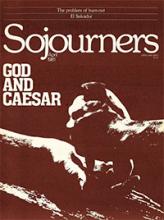The particular state in which we live impinges upon every facet of our lives. Every person relates to the state, whether as helper-in-time-of-need or as oppressor (or even both simultaneously); whether in anger, love, or apathy; whether in form 1040 or in the magistrate's court. In one way or another, a relationship is required.
Obviously this relationship is not a creation of the modern age but an experience of people in all ages and cultures. Christians, then, can look confidently to the biblical literature for pertinent data on this topic.
The Old Testament
The Old Testament people of God related to two basic types of state: 1) their own theocratic state and 2) the pagan states surrounding them, which often saw themselves as theocratic.
Taking the pagan state first, it is clear that the Hebrews always saw themselves as distinct from that state. Abraham was a sojourner, a nomadic chief, who might have lived in the sphere of control of a given state, but who was never a citizen. He maintained his own independence of (and at times parity with) the city-state of his time.
Later, as a captive people, whether in Egypt, Assyria, or Babylon, the Israelites remained conscious of their separate identity. They might indeed have owned land, built houses, planted orchards and vineyards, but they always knew that they belonged somewhere else. They might as an Esther or Daniel have risen to high positions in their country of exile (or of birth), yet they could never fully participate in its culture. They were never Chaldeans or Assyrians or (later) Romans, but, so long as they remained the people of God, always Jews--the "Nation of the Jews" in that locality, as the Romans would later say.
Read the Full Article

